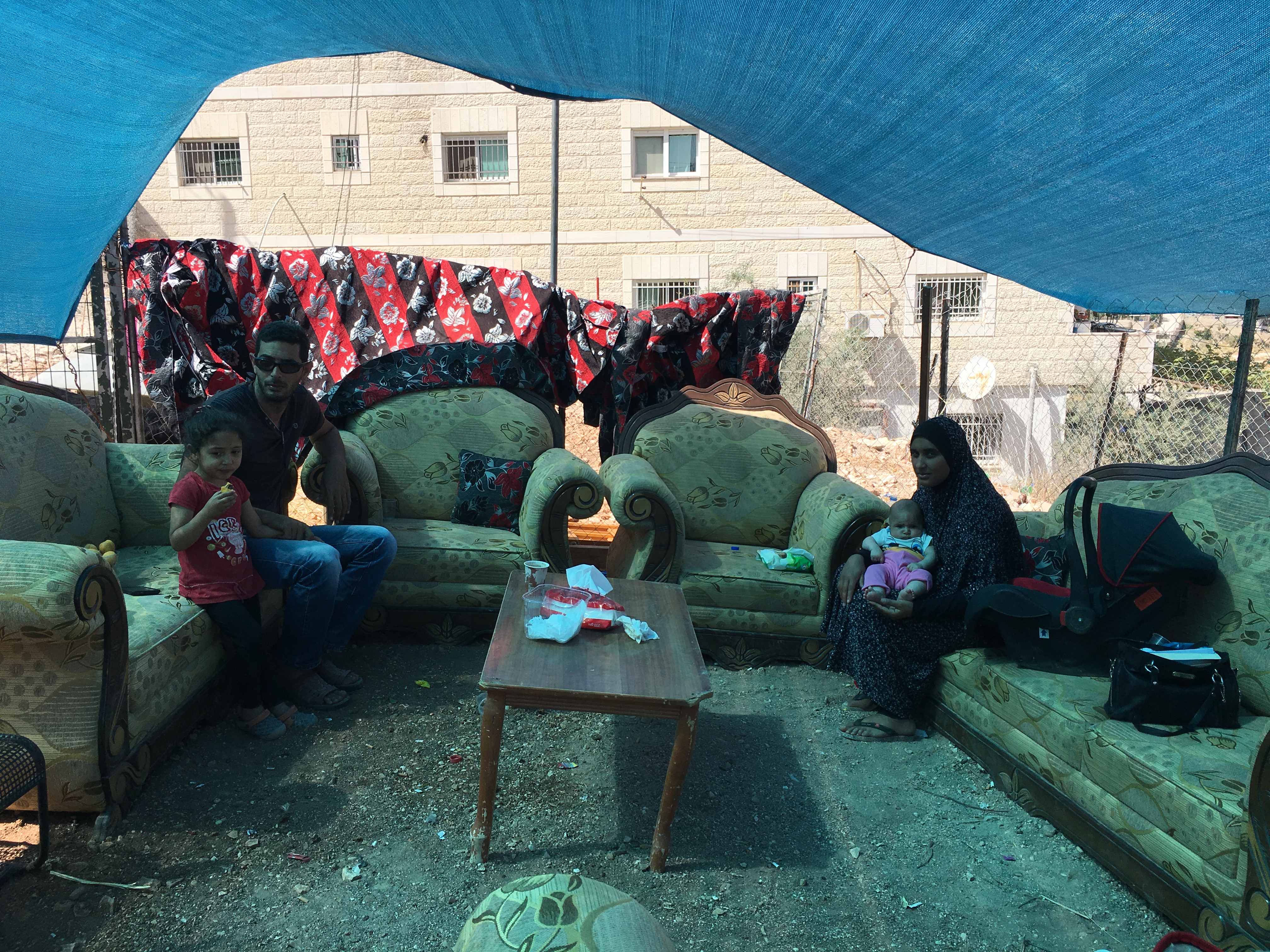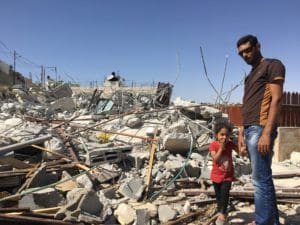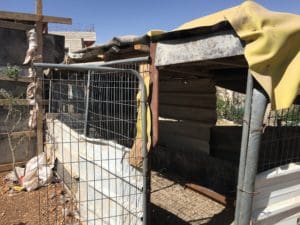This story was first published in Mondoweiss.

Every single home demolition is devastating to a family. Every single family who experiences a demolition tells a unique and surreal story about the day when Israeli bulldozers rolled over their children’s schoolbooks, their grandmother’s prescription medicines, and letters from their uncle overseas.
Home demolition is one of Israel’s preferred methods of evicting Palestinians from land they want, usually to provide housing for Jewish settlements, in violation of international law.
I want to tell just one story — the unique, surreal and totally intolerable story of Ashraf and Islam Fawaqa and their four daughters — Ritaj, 9; Rimas, 7; Saba, 4; and Aya, a newborn.
On May 4, the Fawaqas took baby Aya for a newborn checkup. While at the clinic, they got a call from a neighbor that Israeli authorities had started to demolish their home in the Sur Baher neighborhood of Jerusalem. According to Ashraf, they had paid 25,000 shekels to delay the expected demolition.
“Isn’t that a particularly upsetting case?” I asked a friend.
“All home demolitions are upsetting.”
 “I know. But when Ashraf rushed home and showed the demolition crew the Israeli judge’s order to pause the demolition, do you know what they did? They noted the judge’s name, left the site, and returned one hour later with a new demolition order from the same judge. Ashraf says an emergency court session gave them legal cover for their immoral act. Isn’t that evil?”
“I know. But when Ashraf rushed home and showed the demolition crew the Israeli judge’s order to pause the demolition, do you know what they did? They noted the judge’s name, left the site, and returned one hour later with a new demolition order from the same judge. Ashraf says an emergency court session gave them legal cover for their immoral act. Isn’t that evil?”
“All home demolitions are all evil.”
“I know. But shouldn’t we get some more international media coverage of this case? Surely the world will be appalled that four children, including a newborn, are living on a demolition site under a thin awning stretched over the few sofas they salvaged.”
“There were twelve demolitions in Jerusalem that day.”
“What?”
“Nine Palestinian families’ homes were demolished in Jerusalem on that same day plus three stores.”
I had no words.
“It’s ethnic cleansing,” my friend said. “And sadly, it’s so common that it’s not considered news.”
I visited Ashraf and Islam on May 15, the day of commemoration of the Palestinian Nakba, the ongoing historic expulsion of Palestinians from their land and the attempt to destroy their property, history and identity. I sat on the sofa amidst the rubble, my feet on the hard dirt.
Their little girl, Saba, served me some apricots.
“I see they left your chickens alone,” I commented as one walked by my feet.
“And the chicken coop,” Ashraf pointed out.

I looked and indeed, the chicken coop was standing. “Why did they leave the chicken coop?” I asked.
“I guess so the chickens would have shelter,” Ashraf said ironically.
Ashraf had lived in the house for six years. He built it with his own hands on land Ashraf’s family has owned longer than the State of Israel has even existed.
“That house was built without a permit,” Ashraf motions to one of the neighbors. “They told me they paid a lot of money after the fact and now they have a permit. And that family,” he points to another building,” tried for years to get a permit and was denied. They built without a permit and paid after the fact and I heard that now it’s considered legal.”
The Fawaqa family had already spent hundreds of thousands of shekels, first to try to get a legal building permit, then to pay fines for the home they ultimately built without a permit, and then to delay the demolition until after the baby was born. Now they must pay the expense of demolition itself (90,000 shekels according to Ashraf’s estimate), and the removal of the rubble (60,000 shekels plus a fine if the rubble isn’t removed promptly), and the cost of a temporary shelter. Ironically, Ashraf earned the money he’s paid for the home by working in construction. He works for the Jerusalem Municipality.
In order to have a kitchen, bathrooms and a place to sleep, the Fawaqa family ordered a prefab caravan, not unlike those that some Gazans, whose homes were destroyed by Israeli war planes, consider death traps because of the sweltering temperatures in the summer and the cold in the winter. Ultimately, they will face the cost of rebuilding, and if they build again, the new home will also be subject to demolition.
It seems there’s a great deal of profit to be made in the denial of building permits to Palestinians in Jerusalem.
I’ve visited several demolished families in Jerusalem, since my friend Nureddin was locked in a room with his wife and kids while Israeli authorities demolished the house around them. That experience, and the families I’ve met since then, have me feeling heartbroken and angry.
For Palestinians, owning a home is everything. They spend every penny they have on their homes, forgo every other need and luxury in order to build a home to provide security for their families. But clearly, while the international community makes every effort to uphold Israel’s right to security, little Aya’s right to security is violated with no effective action by those governments obligated to ensure respect for the human rights of Palestinians under occupation. Fortunately, Human Rights Watch did cover this case.
The legitimacy of a state comes from the protections and services it provides to the people in its jurisdiction. What kind of state has an explicit policy to destroy people’s homes? What kind of state has an elaborate infrastructure to make people homeless, impoverished and hopeless? Because that’s what Israel has done—made the destruction of Palestinian lives a national priority.